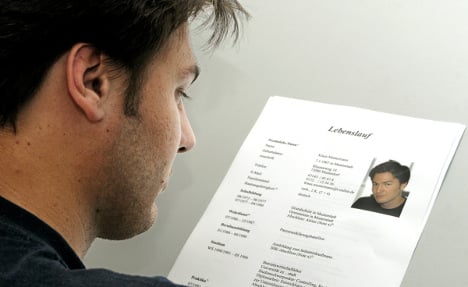Landing a job in Germany as a foreigner can be tough. But knowing what German employers expect from your CV could mean the crucial difference between getting an interview and getting dumped in the wastepaper basket.
The Local spoke to professional careers advisers to find out how job-seekers in Germany can turn a English-language curriculum vitae into a slimmed-down, factual German Lebenslauf.
When sending out an application in Germany it’s important to get the layout of your CV correct. If your information is where German employers will be expecting it, your document will be much easier for them to process at a glance.
“It’s really important to know what you’re doing when writing your German CV. It will get thrown out if you don’t do it in the style which Germans are used to,” career adviser Heidi Störr told The Local.
Check out The Local’s My German Career series for expat success stories
The first thing to note is that a Lebenslauf is one or two pages in a formal, fact sheet format, which looks and feels very different in style and content from a typical English CV.
“The Lebenslauf is a datasheet, a fact sheet,” Gerhard Winkler, contributor to Der Spiegel magazine’s online careers section, told The Local. “The cover letter is a briefing – where you show how you’re right for the job. Both texts are best when they are factual, sober list free of egotistical statements.”
German CVs are also set out in a two-columned table. You need to separate the table into six rows under the following headings written on the left column: ‘Personal Details,’ ‘Professional Experience,’ ‘Education and Training,’ ‘Voluntary Work,’ ‘Scholarships’ and ‘Computer and Language Skills.’
Underneath each of these headings on the left go your exact dates – the time frames of activities, training or jobs which you will list in the right-hand column opposite. It’s best to put activities in reverse chronological order, starting with the most recent, according to career advisers.
The column on the right is where you enter your experiences. Underneath each job title or educational programme, describe your role in short, keyword sentences, concentrating on what you consider the most relevant details for the job you are applying for.
Click here for The Local’s job listings
Germans tend to consider some information you might have on your English CV to be superfluous or even egotistical, said Winkler, so leave out any description of personal qualities, interests and hobbies, but do include membership of groups or organizations under ‘Voluntary Work.’
There are a few must-have personal details every Lebenslauf should include which you might not have on your original CV: a photo, your marital status and place of birth. Also make sure you cover your language and computer skills in detail.
The photo question
Unlike most English resumes, German CVs always include a passport-style professional photo in the upper right-hand corner – a detail advisers say you would do well not to leave out.
“German employers are used to seeing a photo on a résumé, they can’t explicitly demand in the job advert that you put one because that goes against privacy laws,” Störr told The Local.
“But they’ll be looking for it so always put one. A photo allows potential employers to make a different kind of personal connection with someone and will help them connect your skills with your face when you come to an interview.”
Finally, since you will be applying for a job in a German workplace, you need to think carefully about which language to use on your CV. Advisers say if your German is up to it you would do well to show it off.
“If you can do it in German, make the effort, it doesn’t have to be word-perfect,” said Störr.
But if those German lessons have not quite paid off yet, then avoid the temptation to get it translated and leave it in English. This will avoid any awkward moments if you get to an interview and an employer decides to test out your language skills.
“If an applicant has no or only a little German but has written their CV in German it would give the impression they had better language skills than they actually had, which could lead to problems,” said Störr.
“Personally, if English was my first language I’d write applications in Germany in English – unless I had to prove excellent German language skills for the job,” Winkler told The Local.
Generally, said Winkler it was important to remember his golden rule for CV writing: “Stick to the facts.”
Josie Le Blond



 Please whitelist us to continue reading.
Please whitelist us to continue reading.
Member comments